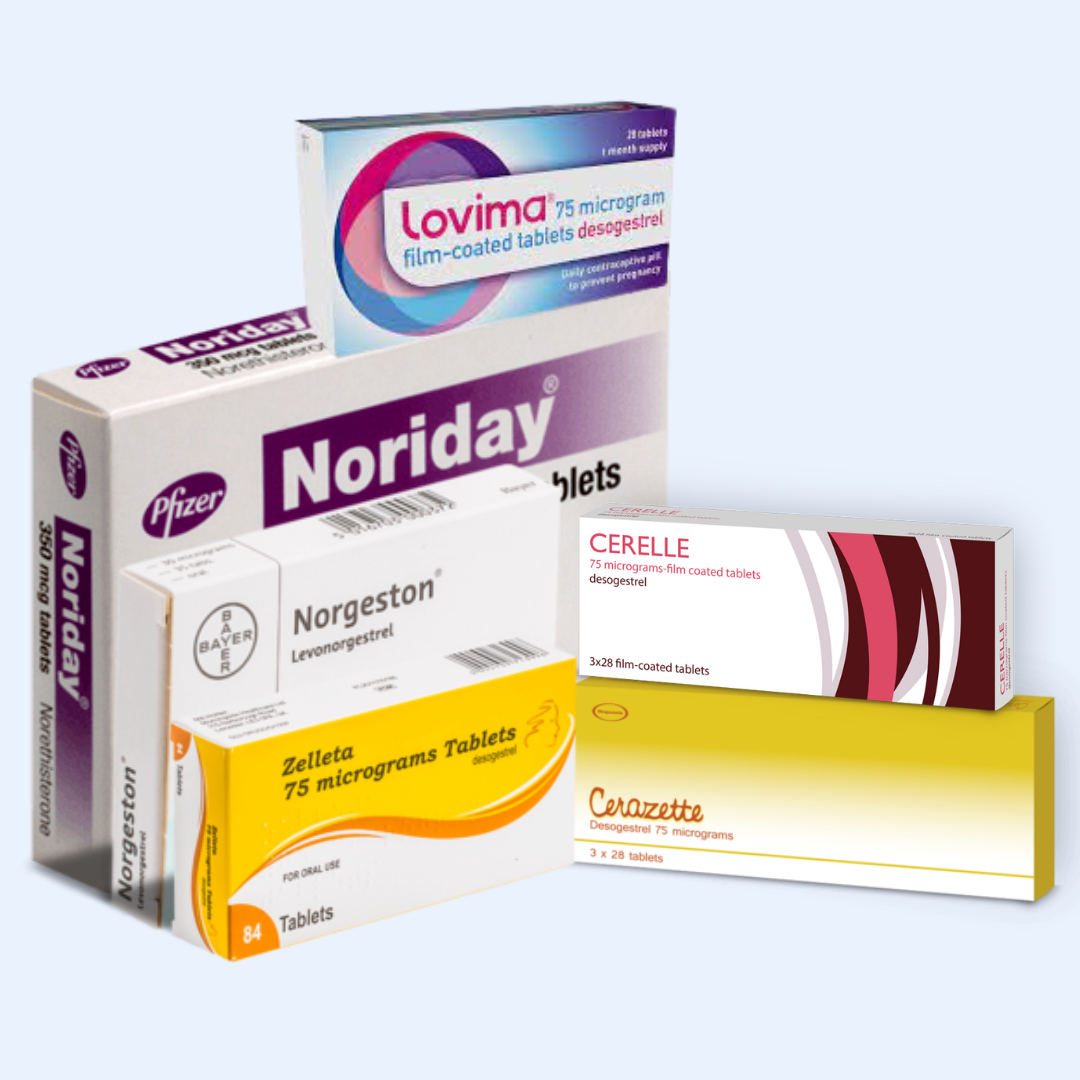Progestogen Only Pill (Mini pill) Information


The progestogen-only pill, commonly referred to as the "POP" or "mini pill", is a form of contraceptive pill that has played a significant role in sexual health and family planning worldwide. Utilising synthetic forms of progestogen, a naturally occurring hormone, this type of contraceptive pill serves as an effective, hormone-based form of birth control. Unlike combined oral contraceptives (COCs) that contain both oestrogen and progestogen, the mini pill offers an alternative for those who are unable to tolerate or are advised against using oestrogen-based contraceptives.
"The progestogen-only pill offers a safe and effective means of birth control that is often overlooked in favour of more commonly used combined contraceptives" explains Dr. James Trussell, a Professor of Economics and Public Affairs at Princeton University notes. "
The significance of the progestogen-only pill in contraception cannot be overstated. It offers an effective means of birth control for a variety of individuals, including those who are breastfeeding or have certain health conditions where oestrogen is contraindicated. This makes the progestogen-only pill an invaluable tool for a wide range of people looking for suitable contraceptive options.
"The progestogen-only pill provides a critical option for those who cannot or choose not to use combined oral contraceptives. Its contribution to reproductive health and freedom is essential" according to the Family Planning Association in the UK.

Buy Zelleta, Cerelle, Norgeston, Noriday, Cerazette, Lovima online here.
The progestogen-only pill is a form of oral contraception that contains a synthetic version of the hormone progestogen. It's used primarily to prevent pregnancy by thickening the mucus in the cervix, making it difficult for sperm to move and reach an egg. In some types, it also stops ovulation, ensuring that no egg is released for potential fertilisation.
The effectiveness of the progestogen-only pill depends on how reliably it's used. It requires a strict regimen of daily intake to ensure the highest efficacy.
The fundamental distinction between the mini pill and combined oral contraceptives is the hormonal components involved. The mini pill contains only progestogen, whereas combined oral contraceptives include both progestogen and oestrogen. This crucial difference affects the suitability and side effects of these contraceptive pills for different individuals.
Combined oral contraceptives may not be suitable for everyone. Certain health conditions, lifestyle factors, and the risk of side effects associated with oestrogen make progestogen-only pills a vital alternative.
There are several progestogen-only pills available, each containing different types of synthetic progestogen. Some of the most common include Cerazette (desogestrel), Micronor (norethisterone), Noriday (norethisterone), and Norgeston (levonorgestrel).
"Each progestogen-only pill has its unique profile of efficacy, side effects, and contraindications," says Dr. Paul Fine, Professor of Medicine at Baylor College of Medicine. It's essential for each individual to consult with a healthcare provider to determine the most suitable option.
In the UK, progestogen-only pills are commonly referred to by their brand names. These include Cerelle and Cerazette (desogestrel), Micronor and Noriday (norethisterone), and Norgeston (levonorgestrel).
While the generic names of the progestogen hormone may vary, their purpose remains the same - to offer a viable, effective contraceptive method to those for whom oestrogen-based contraceptives are not appropriate." explains Dr. Sarah Jarvis, a UK-based General Practitioner and Women's Health Specialist.
Desogestrel is a synthetic form of progestogen used in certain types of progestogen-only pills, including Cerazette and Cerelle. Unlike some other mini pills, desogestrel-based pills work by preventing ovulation, and as a secondary mechanism, thickening the cervical mucus.
Desogestrel progestogen-only pills are particularly effective because they use a two-pronged approach. Not only do they thicken the cervical mucus to inhibit sperm movement, but they also suppress ovulation. This dual action enhances their contraceptive efficacy.
Desogestrel progestogen-only pills offer specific benefits, including being suitable for use while breastfeeding, for women who cannot use contraception containing oestrogen, and for those who are over 35 and smoke. Additionally, they may also result in lighter, less painful periods.
Desogestrel progestogen-only pills are a safe and effective contraceptive option that accommodates a variety of patient needs. Their adaptability is a significant advantage in a comprehensive family planning strategy.
The main difference between the progestogen-only pill (POP) and the combined oral contraceptives (COCs) lies in their hormonal constituents. While COCs contain both oestrogen and progestogen, the POP only contains progestogen.
The exclusion of oestrogen in the mini pill offers an effective alternative for individuals who are sensitive to oestrogen or have health conditions that contraindicate its use.
Because COCs contain oestrogen and progestogen, they can regulate the menstrual cycle, providing predictable, regular periods. They also suppress ovulation, making them a highly effective contraceptive method. The POPs, on the other hand, primarily work by thickening cervical mucus to prevent sperm penetration. Some POPs like desogestrel also suppress ovulation. The impact on the menstrual cycle varies, potentially causing irregular or even absent periods in some women.
The hormonal differences between the two types of pills translate to different physiological impacts. These differences can influence the choice of contraceptive depending on an individual's health profile and personal preferences.
The progestogen-only pill primarily works by thickening the cervical mucus, which inhibits sperm from reaching the egg. Some types, like those containing desogestrel, also suppress ovulation. This dual mechanism makes desogestrel pills particularly effective.
The progestogen-only pill operates through a robust mechanism that ensures effective contraception without the need for oestrogen.
The progestogen-only pill's effect on menstruation can vary. Some women may experience irregular bleeding, others may have no changes, and yet others may have their periods stop altogether. The response is individual and can also depend on the type of progestogen-only pill used.
Some women find that their periods stop while using the progestogen-only pill, but it's a variable response. For many, the absence of menstruation is not a problem, and may even be a welcome change.
The primary use of the progestogen-only pill is as a contraceptive. It's particularly useful for women who cannot use contraceptives that contain oestrogen.
The progestogen-only pill provides a vital contraceptive option for women who cannot use or choose not to use oestrogen-based contraceptives.
In addition to contraception, the progestogen-only pill can also be used to manage certain gynaecological conditions such as endometriosis and menstrual disorders, including heavy or painful periods.
Progestogen-only pills can offer symptom relief for conditions like endometriosis and heavy menstrual bleeding, making them a versatile therapeutic option.
The progestogen-only pill should be taken every day at the same time, with no break between packs. The effectiveness can be compromised if a pill is taken more than 3 hours late (or 12 hours late for desogestrel pills).
"Adherence to the daily regimen is crucial for the effectiveness of the progestogen-only pill. It's important to take it at the same time each day for optimal results" explains Dr. Christina Stika, a Clinical Associate in the Department of Obstetrics and Gynecology advises
If a pill is missed, it should be taken as soon as remembered, even if this means taking two pills in one day. If the pill is taken more than 3 hours late (or 12 hours late for desogestrel pills), contraceptive protection may be reduced and additional precautions, such as condoms, should be used for the next 2 days.
"If you miss a pill, take it as soon as you remember. But be mindful that you may need to use additional contraception if the pill was taken late," says Dr. Aileen Gariepy, Assistant Professor of Obstetrics, Gynecology and Reproductive Sciences at Yale School of Medicine.
The progestogen-only pill is highly effective at preventing pregnancy when used correctly. With perfect use, fewer than 1 in 100 women will get pregnant in a year. With typical use, around 9 in 100 women may get pregnant in a year.
The efficacy of the progestogen-only pill is largely determined by adherence. With perfect use, it provides highly reliable contraception.
The absence of oestrogen in the progestogen-only pill makes it suitable for women who cannot take oestrogen due to medical conditions or side effects. This includes women over 35 who smoke, women with a history of blood clots, or those with conditions such as migraines or high blood pressure.
"The progestogen-only pill offers a critical contraceptive option for those who are oestrogen intolerant or contraindicated. Its role in ensuring a comprehensive approach to contraception cannot be overstated," states Dr. Amanda Black, Professor of Obstetrics and Gynecology at the University of Ottawa.
Progestogen-only pills can help alleviate certain menstruation-related symptoms, such as heavy or painful periods. Some users may also experience reduced menstrual bleeding or even amenorrhea (absence of menstruation), which can be beneficial for women with menorrhagia (heavy periods).
Dr. Petra Stute, Head of the Department of Obstetrics and Gynaecology at the Inselspital, Bern University Hospital, adds, "Progestogen-only pills can lead to an improvement in menstruation symptoms for some women, providing additional non-contraceptive benefits."
Unlike combined oral contraceptives, which can potentially affect milk supply, the progestogen-only pill is safe to use while breastfeeding. This makes it an excellent choice for postpartum contraception.
Dr. Miriam Hadjadj, a researcher in Reproductive Medicine at the University of Lille, says, "For breastfeeding mothers seeking contraception,
Like all medicines, the progestogen-only pill can cause side effects. Common side effects can include changes in menstrual bleeding patterns, mood changes, and headaches.
"These side effects are generally mild and often resolve after the first few months of use," explains Dr. Caitlin Dunne, a fertility specialist at the Pacific Centre for Reproductive Medicine.
Desogestrel, a type of progestogen-only pill, may also cause side effects like acne, breast tenderness, and nausea. In rare cases, it may increase the risk of developing blood clots.
Dr. Melina Thanasoula, a researcher in Reproductive Medicine at the University of Oxford, advises, "While the risk of blood clots with desogestrel pills is slightly higher compared to other progestogen-only pills, it's still significantly lower than the risk associated with combined oral contraceptives.
It's essential to seek medical advice if any side effects are persistent, bothersome, or if there are symptoms like persistent lower abdominal pain, unusual bleeding, chest pain, or if you notice a lump in your breast.
If you experience severe side effects or unusual symptoms, it's important to contact your healthcare provider promptly.
The main disadvantage of the progestogen-only pill is that it must be taken at the same time each day to be most effective. It also doesn't protect against sexually transmitted infections (STIs). Additionally, the impact on menstruation can be unpredictable and varies from person to person.
"While progestogen-only pills are a very effective form of contraception, their effectiveness can be compromised if not taken consistently at the same time each day. It's also crucial to remember they don't offer protection against STIs," says Dr. Sarah Prager, Director of the Family Planning Division and a Professor in the Department of Obstetrics and Gynecology at the University of Washington.
There arealso certain health conditions which may prevent some women from using the progestogen-only pill, such as breast cancer, unexplained vaginal bleeding, or severe liver disease. Furthermore, some medications can interfere with the effectiveness of progestogen-only pills, including certain antibiotics, antiretrovirals, and epilepsy medications.
Certain health conditions and medications can impact the effectiveness and suitability of the progestogen-only pill, so it's crucial to discuss your health history and any medications you're taking with your healthcare provider.
The progestogen-only pill can be used by most women, including those over the age of 35 and smokers – two groups for whom combined oral contraceptives are not typically recommended.
Dr. Mary Jane Minkin, a Clinical Professor of Obstetrics, Gynecology, and Reproductive Sciences at Yale University School of Medicine, asserts, "The progestogen-only pill offers a safe and effective contraceptive method for many women, including those over 35 and smokers."
However, some progestogen-only pills like desogestrel may carry a small increased risk of developing blood clots, especially in women who smoke or have a high BMI. Therefore, healthcare providers might recommend other forms of contraception for these groups.
Although the risk is small, we do need to consider the potential for an increased risk of blood clots with desogestrel in women who smoke or have a high BMI.
Reviews of the progestogen-only pill are varied, as different individuals may have different responses to the same medication. Some women find that the progestogen-only pill suits them well and helps manage their contraception and other health needs effectively.
According to Dr. Susan Wysocki, a Women's Health Nurse Practitioner and the president and CEO of iWomansHealth, "Individual experiences with the progestogen-only pill can vary widely, with some women experiencing benefits beyond contraception, such as improvement in menstrual problems.
Despite individual variations, certain themes do emerge in user reviews. Many women appreciate the mini pill's effectiveness as a contraceptive and its non-interference with breastfeeding. On the flip side, the strict timing for ingestion and changes in menstrual cycle are often reported as downsides.
Dr. Sonia Bahlani, an Obstetrician-Gynecologist in New York, notes, "The most commonly cited benefits in reviews are its efficacy and its compatibility with breastfeeding. However, some users express frustration with having to take the pill at the same time each day and the unpredictability of their menstrual cycle."
The combined oral contraceptives (COCs), which include both estrogen and progestogen, are a common alternative to the progestogen-only pill. However, COCs may not be suitable for everyone due to potential side effects and certain health conditions.
"While combined oral contraceptives offer the convenience of oral administration and highly effective contraception, they may increase the risk of blood clots and are not suitable for certain women, such as those over 35 who smoke " explains Dr. Amy Autry.
Other alternatives to the progestogen-only pill include intrauterine devices (IUDs), contraceptive injections, patches, and implants. These methods offer longer-term contraception and can be an effective alternative for women who find daily pill-taking challenging.
Long-acting reversible contraceptives like IUDs and implants offer high efficacy and convenience. It's crucial that women are made aware of these options when considering contraception.
Cerazette, a specific brand of desogestrel progestogen-only pill, can have side effects including irregular menstrual periods, mood changes, and headaches. In rare cases, it may also increase the risk of developing blood clots.
Cerazette, like other progestogen-only pills, can cause side effects. Most are mild and temporary, but women should be aware of the rare but serious risk of blood clots.
In conclusion, the progestogen-only pill offers a highly effective method of contraception that is suitable for a wide range of women, including those who cannot take combined oral contraceptives. It also presents a feasible solution for managing menstrual disorders and endometriosis. However, it comes with its unique set of challenges such as strict timing for consumption and potential side effects.
It is essential to discuss with a healthcare provider before starting any contraceptive method, including the progestogen-only pill. This ensures that the chosen method aligns with the woman's individual health profile and lifestyle needs.
The decision about which contraceptive method to use should be made in consultation with a healthcare provider, taking into account a woman's individual health status, reproductive goals, and lifestyle.
By educating oneself on the various contraceptive options available, including the progestogen-only pill, one can make an informed choice that prioritises both health and personal needs.








Plus get the inside scoop on our latest content and updates in our monthly newsletter.